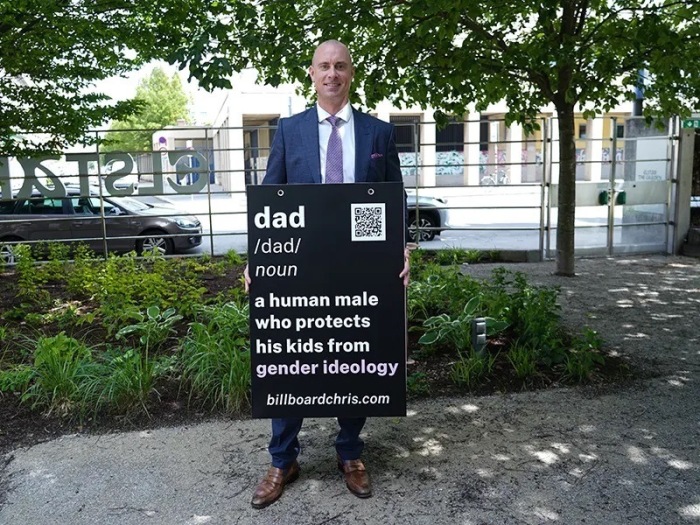
A tribunal in Melbourne, Australia, has ruled in favor of Canadian activist Chris “Billboard Chris” Elston, overturning a government order to remove one of his social media posts expressing his views on gender identity, under that country’s Online Safety Act. The decision marks a major legal victory for the social media platform X, which had also challenged the takedown order.
Elston’s post, published in February 2024, criticized the appointment of trans-identified activist Teddy Cook to an expert position at the World Health Organization and referred to Cook using biologically based pronouns.
The post was deemed “cyber abuse” by Australia’s eSafety Commissioner, who then issued a removal order to X, according to the legal advocacy group ADF International, which, in conjunction with the Human Rights Law Alliance in Australia, coordinated the legal challenge.
X initially resisted the demand, later opting to geo-block the post within Australia.
The legal challenge to the eSafety Commissioner’s ruling was filed jointly by Elston and X.
The Administrative Review Tribunal held a week-long hearing in Melbourne beginning March 31, where it reviewed whether the post constituted cyber abuse. This week, the Tribunal ruled that the Commissioner had erred in classifying Elston’s expression as abusive and formally set aside the removal order.
Deputy President O’Donovan, who presided over the Tribunal, cited Elston’s testimony at length. Elston had stated that he would not use pronouns inconsistent with a person’s biological sex, calling it “untrue” and arguing that doing so “has implications for the rights and safety of women and children.”
The ruling acknowledged Elston’s consistent use of sex-based pronouns as a reflection of his beliefs rather than a form of targeted harassment. The tribunal concluded that Elston’s post did not meet the statutory threshold for cyber abuse under the Online Safety Act and should not have been subject to regulatory action by the commissioner.
O’Donovan wrote, “I am satisfied that it is his universal practice to refer to a transgender person by the pronouns that correspond to their biological sex at birth.”
The ruling arrives amid growing scrutiny of the Australian government’s expanding authority over online content.
The United States House Judiciary Committee recently released a report documenting international censorship efforts, including cooperation between Australia’s eSafety Commissioner and the Global Alliance for Responsible Media, a group linked to the World Economic Forum. According to the committee, GARM coordinated with regulators and advertisers to suppress content deemed politically unfavorable.
Published emails show that eSafety Commissioner Julie Inman-Grant explicitly referenced GARM’s influence in shaping her office’s regulatory actions, stating that the group had “very powerful levers” and requested frequent updates to help guide her decisions.
The U.S. State Department weighed in on the case in May, calling the Australian commissioner’s actions part of a trend of coercive censorship.
In his public reaction to the decision, Elston said, “I’m grateful that truth and common sense have prevailed. This decision sends a clear message that the government does not have [the] authority to silence peaceful expression.”
He added, “My mission is to speak the truth about gender ideology, protecting children across the world from its dangers.”
Paul Coleman, executive director of ADF International, said the ruling was a “decisive win for free speech” and criticized the Australian government for targeting a Canadian citizen’s post on an American-owned platform.
“Today, free speech has prevailed,” Coleman said. “This is a victory not just for Billboard Chris, but for every Australian — and indeed every citizen who values the fundamental right to free speech.”
The platform X also issued a statement through its Global Government Affairs Team, calling the ruling a “victory for free speech.” The statement said the company had faced an AUD $800,000 ($525,000) fine if it failed to comply with the commissioner’s censorship demand. X characterized the post as part of “a broader political discussion involving issues of public interest that are subject to legitimate debate.”

















